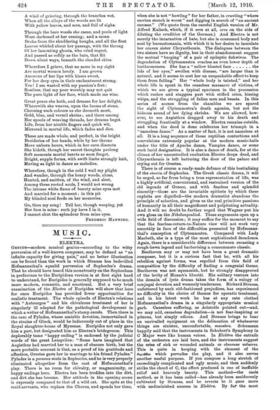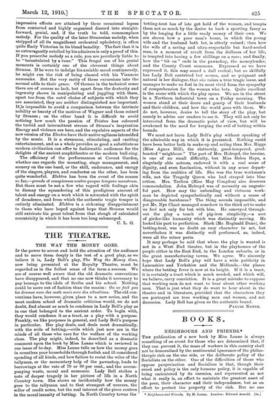MUSIC.
ELEKTRA.
GENIUS—modern musical genius—according to the witty perversion of a well-known composer, may be defined as " an infinite capacity for giving pain," and no better illustration can be found than the work in which Strauss has bedeviled Hofmannsthal's squalid perversion of Sophocles's drama. That he should have based this monstrosity on the Sophoclean in preference to the Euripidean version is at first sight hard to understand, for Euripides is generally supposed to be much more modern, romantic, and emotional. But a very brief examination of the Electra of Euripides will show that here for once Euripides has provided fewer opportunities for realistic treatment. The whole episode of Electra's relations with "Autourgos " and his chivalrous treatment of her is singularly ill adapted for the pathological development in which a writer of Hofmannsthal's stamp excels. Then there is the case of Pylades, whose amiable devotion, immortalised in the strains of Gluck, would be ludicrously out of place in the Royal slaughter-house of Mycenae. Euripides not only gave him a part, but designated him as Electra's bridegroom. This deplorably tame "happy ending" is endorsed by the judicial words of the great Lempriere : " Some have imagined that Aegisthus had married her to a man of obscure birth, but the more probable account is that, as a proof of his gratitude and affection, Orestes gave her in marriage to his friend Pylades." Pylades is a persona meta in Sophocles, and he is very properly eliminated altogether from the cast of Hofmannsthal's play. There is no room for chivalry, or magnanimity, or happy endings here. Electra has been trodden into the dirt, and dirt she has become. Her attitude in the opening scene is expressly compared to that of a wild cat. She spits at the maid-servants, who replace the Chorus, and spends her time,
when she is not " howling" for her father, in crawling "where carrion stench is worst " and digging in search of "an ancient carcase." (We quote from the careful English version of Mr. Alfred Kalisch, which, if it errs at all, errs on the side of diluting the crudities of the German.) And Electra is not merely the incarnation of hate, but she is consumed body and soul by haematomania, with which it is her desire to inoculate her craven sister Chrysothemis. The dialogues between the two sisters have no dignity, but in their abandonment suggest the mutual "barging" of a pair of epileptic fishwives. The degradation of Clytemnestra reaches an even lower depth of
loathsomeness. She has a " sallow bloated face the lids of her eyes," swollen with disease, "are larger than is natural, and it seems to cost her an unspeakable effort to keep them from falling." Her " whole body is tainted," and her whole life is spent in the ceaseless massacre of victims, of which we are given a typical specimen in the procession which rushes and staggers past with stifled cries, hissing whips, and the struggling of fallen men and beasts. In this series of scenes from the shambles we are spared the sight of Clytemnestra's death agonies, but not the hideous sound of her dying shrieks. We are allowed, how- ever, to see Aegisthus dragged away to his death and struggling frantically at a window. Electra remains outside, and when the deed is done celebrates her triumph in a "nameless dance." As a matter of fact, it is not nameless at all. It is a long sequence of those reptilian contortions and convulsions extremely popular at the modern music-halls under the title of Apache dance, Vampire dance, or some such lurid designation. It is also a dance of death, for at the climax of her uncontrolled exultation Electra drops dead, and Chrysothemis is left battering the door of the palace and crying out for Orestes.
There is of course a ready-made defence of this bestialising of the Ekoxia of Sophocles. The Greek classic drama, it will be urged, so far from being a true representation of life, was a highly artificial, conventional, and restrained version of the old legends of Greece, and with fearless and splendid sincerity—those are the invariable epithets by which these exploits are dignified—the modern dramatist abandons the principle of selection, and gives us the real primitive passions of humanity in all their magnificent and palpitating actuality. And it will no doubt be further urged that Wagner put his own gloss on the Nibelungenlied. These arguments open up a wide field of discussion ; it may suffice for the moment to say that the fearless-return-to-Nature view will not work very smoothly in face of the difficulties presented by Hofmanns- thal's conception of Clytemnestra. Compared with Lady Macbeth, she is a type of the most sophisticated decadence. Again, there is a considerable difference between recasting a rough-hewn legend and barbarising a consummate classic.
Beethoven may or may not have been a great dramatic composer, but it is a curious fact that he, with all his rebellion against forms, was repelled from this field of composition by the difficulty of finding a congenial theme. Beethoven was not squeamish, but he strongly disapproved of the levity of Mozart's libretti. His solitary venture into the domain of lyric drama takes the form of a eulogy of conjugal devotion and womanly tenderness. Richard Strauss, unfettered by such old-fashioned prejudices, has experienced no difficulty in the choice of themes for operatic treatment, and in his latest work he has at any rate clothed Hofmannsthal's drama in a singularly appropriate musical garb. Causeless suffering, as Aristotle pointed out—and, we may add, causeless degradation—is not fear-inspiring or piteous, but simply odious. And Strauss brings to bear an unrivalled equipment on the delineation of whatsoever things are sinister, uncomfortable, macabre. Schumann happily said that the instruments in Schubert's Symphony in C Major were like human voices. In Elektra the entrails of the orchestra are laid bare, and the instruments suggest the cries of sick or wounded animals or obscenae volucres. This is quite in keeping with the element of the aspaass which pervades the play, and it also serves another useful purpose. If you compose a long stretch of exceedingly complicated and ugly music, and then suddenly strike the chord of C, the effect produced is one of ineffable relief and heavenly beauty. This method—the oasis method, as it has been called—has already been assiduously cultivated by Strauss, and he reverts to it once more with undiminished success in Elektra. By far the most impressive effects are attained by these occasional lapses from contorted and highly organised discord into straight- forward, genial, and, if the truth be told, commonplace melody. For the quality of the later Straussian melody, when stripped of all its magnificent orchestral upholstery, is often quite Early Victorian in its bland banality. The fact that it is so extravagantly extolled by his admirers is only a proof of this. If you proscribe melody as a rule, you are peculiarly liable to be " tarantulated by a tune." This frugal use of his genial moments is certainly one of the cleverest things about Strauss. If he were to indulge his amiable mood continuously, he might run the risk of being classed with his Viennese namesake. But the very rarity of these excursions into the normal adds to their grace. Of themes in the technical sense there are of course no lack, but apart from the dexterity and ingenuity shown in manipulating and juggling with them, apart too from the outré choice of subjects with which they are associated, they are neither distinguished nor important. It:is impossible to avoid a comparison between the intrinsic nobility or beauty of the motives of Wagner and those coined by Strauss ; on the other hand it is difficult to avoid noticing how much the passion of Tristan has coloured the turbid and intermittent stream of Strauss's inspiration Energy and violence are here, and the repulsive aspects of the new version of the Electra have their native ugliness intensified by the music. It is a strenuous, stimulating, and exciting entertainment, and as a whole provides as good a substitute as modern civilisation can offer to fashionable audiences for the delights of the ancient amphitheatre or the modern bull-ring.
The efficiency of the performances at Covent Garden, whether one regards the mounting, stage management, and scenery on the one hand, or the skill, endurance, and energy of the singers, players, and conductor on the other, has been quite wonderful. Elektra has been the event of the season so far,—grancle et conspicuumnostro quoque tempore monstrum. But there must be not a few who regard with feelings akin to dismay the squandering of this prodigious amount of talent and energy on a work which is saturated with the spirit of decadence, and from which the authentic tragic temper is entirely eliminated. Elektra is a sickening disappointment to those who have hoped against hope that Strauss would still extricate his great talent from that slough of calculated eccentricity in which it has been too long submerged.
C. L. G.















































 Previous page
Previous page